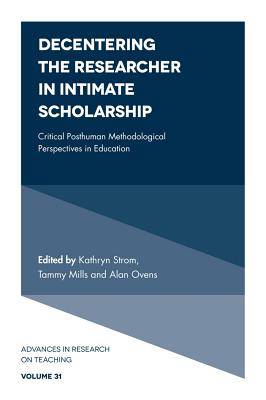
Bedankt voor het vertrouwen het afgelopen jaar! Om jou te bedanken bieden we GRATIS verzending (in België) aan op alles gedurende de hele maand januari.
- Afhalen na 1 uur in een winkel met voorraad
- In januari gratis thuislevering in België
- Ruim aanbod met 7 miljoen producten
Bedankt voor het vertrouwen het afgelopen jaar! Om jou te bedanken bieden we GRATIS verzending (in België) aan op alles gedurende de hele maand januari.
- Afhalen na 1 uur in een winkel met voorraad
- In januari gratis thuislevering in België
- Ruim aanbod met 7 miljoen producten
Zoeken
Decentering the Researcher in Intimate Scholarship
Critical Posthuman Methodological Perspectives in Education
€ 235,45
+ 470 punten
Omschrijving
"Intimate scholarship" refers to qualitative methodologies, such as self-study and autoethnography, that directly engage the personal experience, knowledge, and/or practices of the researcher(s) as the focus of inquiry. While intimate scholarship offers entrypoints into non-binary thinking by blurring the line between researcher/researched, much work in this genre continues to reinforce a humanist "I". In this volume, we ask what happens when the researcher in forms of intimate scholarship is decentered, or is considered as merely one part of an entangled material-discursive formation. Chapters in this volume highlight ways that researchers of teaching and teacher education can advance conversations in education while exploring theories with an ontological view of the world as fundamentally multiple, dynamic, and fluid. Drawing on a range of methods, authors "put to work" posthuman, non-linear, and multiplistic theories and concepts to disrupt and decenter the "I" in intimate methodologies. Also featured in this volume are conversations with leading posthuman scholars, who highlight the possibilities and challenges of decentering the researcher in intimate scholarship as a practice of social justice research.
Specificaties
Betrokkenen
- Uitgeverij:
Inhoud
- Aantal bladzijden:
- 248
- Taal:
- Engels
- Reeks:
- Reeksnummer:
- nr. 31
Eigenschappen
- Productcode (EAN):
- 9781787546363
- Verschijningsdatum:
- 17/10/2018
- Uitvoering:
- Hardcover
- Formaat:
- Genaaid
- Afmetingen:
- 155 mm x 231 mm
- Gewicht:
- 458 g

Alleen bij Standaard Boekhandel
+ 470 punten op je klantenkaart van Standaard Boekhandel
Beoordelingen
We publiceren alleen reviews die voldoen aan de voorwaarden voor reviews. Bekijk onze voorwaarden voor reviews.








